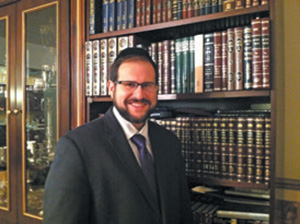
During the past couple of weeks, our 3 ½- (and ¼ ) -year-old son, Dovid, wakes up every morning and asks if it’s Shabbos Kodesh. I wish I could say that he’s so drawn to the sanctity of the day that he can’t stop asking about it. But the truth is that it’s because on Shabbos morning he gets to eat “his favorite cereal in the whole wide world” in honor of Shabbos.
I recall from my youth that breakfast cereals are not just about the cereal, but also about the boxes. Some time ago, there was a study (Cornell Food & Brand Lab Researchers) conducted about the influence cereal boxes have on children. The study revealed that when cereal boxes are stocked on the shelves of supermarkets, they’re placed on the bottom two shelves, and at an angle. Doing so ensures that the character displayed on the box is making eye contact with the child walking down the aisle. (Don’t ask me why anyone studied this; I’m just reporting the facts.)
In the Staum home when we were growing up, there was great competition about who gets to look at the cereal box while eating the cereal. I’m not really sure what the appeal was to read the nutrition facts, but for some reason it became a goal to read the entire box while eating. The greatest mornings were when we were able to surround ourselves with a few different boxes, like an impenetrable fort.
One of our greatest deficiencies, that all of us suffer from today, lies in our inability to focus on the present moment. Our distractibility is out of control. We live in a world that worships multi-tasking. The price of doing so, however, is the forfeiture of living in, or at least living with, the present moment.
According to a study of 5,000 people by psychologists Matthew Killingsworth and Daniel Gilbert (Harvard), adults only spend 50 percent of their time focused on the present moment. That means that we are mentally checked out half of the time. The study also showed that people were happiest when they were fully engaged in whatever they were doing at the present moment. That means, people were happier when they were engrossed in something they didn’t enjoy, than when they were only half engaged in something they did enjoy.
Chazal say that “now” is an expression of teshuva. The literal definition of teshuva is to return. In all of our day-to-day busyness we tend to become distracted from our life goals and direction. By “returning” to Hashem we are really returning to ourselves as well. The first step toward that is by turning inward, deciding whether we are living up to our own expectations. That comes from living in the moment and not becoming weighed down by the past, or hyper-focused on the future.
If we don’t stop to fully experience the things we do enjoy—such as eating—it’s no wonder that we have such a hard time living in the moment. We seem to be so busy reading the boxes that we never fully enjoy their contents.
So, in a nutshell, the message of Elul is to stop reading the cereal boxes and just enjoy the cereal!
By Rabbi Dani Staum LMSW
Rabbi Dani Staum, LMSW, is the rabbi of Kehillat New Hempstead as well as a rebbe and the guidance counselor at Heichal HaTorah in Teaneck, New Jersey, and principal at Mesivta Ohr Naftoli of New Windsor. Rabbi Staum is a division head at Camp Dora Golding. He also presents parenting classes based on the acclaimed Love and Logic methods. His email address is stamtorah@gmail.com. His website is: www.stamtorah.info.













